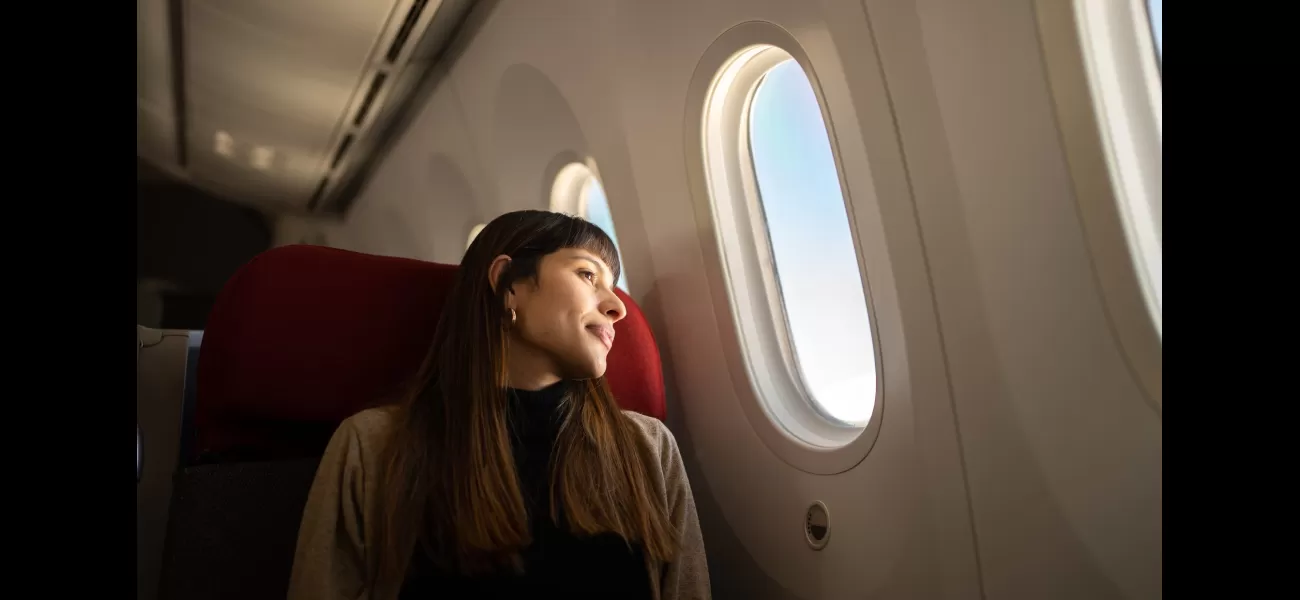Do you find 'rawdog' travel too much to handle? This is the reason why individuals do it.
The key is being by yourself and reflecting on your thoughts.
June 30th 2024.

Have you ever considered ditching all forms of entertainment and technology during a long flight or train ride? It may seem like a daunting concept, but for 40-year-old Anna Roberts, CEO of Explorage, it's a regular part of her travel routine. She even refers to it as "rawdogging," a term that may raise some eyebrows among those familiar with slang. But before you jump to conclusions, let Anna explain.
According to Urban Dictionary, rawdogging typically refers to having unprotected sex, but it has evolved to encompass a wider meaning. In the context of travel, it now refers to going without any form of entertainment – no scrolling through your phone, no screens, and not even a book or magazine to pass the time. It may seem like a challenge, but for some, it has become a badge of honor, with many sharing their "personal bests" on TikTok.
For Anna, rawdogging a long trip is a way to disconnect from the constant need to be "on" and connected. It gives her a few hours to let her mind wander, observe small details, and explore ideas without any immediate pressure to act on them. And she's not alone in her love for this pared-back form of travel.
Louisa Dunbar, founder of web agency OrangeGrove, also sees travel time as an opportunity to slow down and reflect. She recently spent a 2.5-hour coach ride with just her own thoughts for entertainment. She describes how she starts by taking in her surroundings, observing the people and their actions. It gives her a glimpse into the lives of strangers, which can be quite grounding. These distraction-free hours have even sparked some of her best ideas, but it's not all about productivity. Louisa believes that people are often too immersed in their technology or books, missing out on the life happening around them.
Jess Shaw, founder of PACT Creative Training, also sees travel time as a chance to reflect and ponder. She recalls her personal best of 36 hours on a coach between Bolivia and Brazil, using the time for contemplation without any distractions. She believes that this "time out of time" creates space for creative thought, processing memories, and connecting to autobiographical memory, which contributes to our sense of identity.
Of course, not everyone may find the idea of disconnecting from technology and entertainment for that long appealing. But as Dr. Claire Plumbly, a psychologist, explains, it's scientifically proven that our brains need breaks from constant stimulation. She describes how our Default Mode Network, activated when we're asked to "think of nothing," is essential for creative thought and processing memories. Jess advises a simple way to clear your mind – by staying in the present moment without self-criticism, perhaps by counting your breaths.
Rawdogging travel is a response to the "always on" culture that technology has created. It's becoming a lost art to make your own fun, and taking breaks from screens is crucial for keeping your mind sharp, similar to sleep. Dr. Sophie Mort, a clinical psychologist, warns of the extensive impact of stress on our bodies and minds. It can affect all bodily systems, including the immune system, leading to more frequent illnesses.
Psychologist Tobba Vigfusdóttir agrees that mental downtime is crucial for cognitive processing and emotional well-being, and it should be a regular activity, regardless of whether we're flying or not. However, she acknowledges that the rawdogging approach may not suit everyone, and some may find comfort and escapism in familiar activities like reading or watching a movie.
The key is not to be too hard on yourself and have a backup plan if boredom becomes too overwhelming. Jess suggests starting small, perhaps by putting your phone away for a few minutes during your commute to or from work, to give yourself time to reconnect with yourself before entering your daily routine. And if all else fails, Anna turns to mindfulness and meditation to clear her thoughts, but she also keeps a journal handy to jot down any ideas or images that come to her during her rawdogging sessions.
So, the next time you find yourself on a long-haul flight or train ride, consider giving rawdogging a try. Who knows, you may come out of it feeling more relaxed and with some brilliant new ideas. Do you have a story to share about your rawdogging travel experience? We'd love to hear it! Send us an email at [email address].
According to Urban Dictionary, rawdogging typically refers to having unprotected sex, but it has evolved to encompass a wider meaning. In the context of travel, it now refers to going without any form of entertainment – no scrolling through your phone, no screens, and not even a book or magazine to pass the time. It may seem like a challenge, but for some, it has become a badge of honor, with many sharing their "personal bests" on TikTok.
For Anna, rawdogging a long trip is a way to disconnect from the constant need to be "on" and connected. It gives her a few hours to let her mind wander, observe small details, and explore ideas without any immediate pressure to act on them. And she's not alone in her love for this pared-back form of travel.
Louisa Dunbar, founder of web agency OrangeGrove, also sees travel time as an opportunity to slow down and reflect. She recently spent a 2.5-hour coach ride with just her own thoughts for entertainment. She describes how she starts by taking in her surroundings, observing the people and their actions. It gives her a glimpse into the lives of strangers, which can be quite grounding. These distraction-free hours have even sparked some of her best ideas, but it's not all about productivity. Louisa believes that people are often too immersed in their technology or books, missing out on the life happening around them.
Jess Shaw, founder of PACT Creative Training, also sees travel time as a chance to reflect and ponder. She recalls her personal best of 36 hours on a coach between Bolivia and Brazil, using the time for contemplation without any distractions. She believes that this "time out of time" creates space for creative thought, processing memories, and connecting to autobiographical memory, which contributes to our sense of identity.
Of course, not everyone may find the idea of disconnecting from technology and entertainment for that long appealing. But as Dr. Claire Plumbly, a psychologist, explains, it's scientifically proven that our brains need breaks from constant stimulation. She describes how our Default Mode Network, activated when we're asked to "think of nothing," is essential for creative thought and processing memories. Jess advises a simple way to clear your mind – by staying in the present moment without self-criticism, perhaps by counting your breaths.
Rawdogging travel is a response to the "always on" culture that technology has created. It's becoming a lost art to make your own fun, and taking breaks from screens is crucial for keeping your mind sharp, similar to sleep. Dr. Sophie Mort, a clinical psychologist, warns of the extensive impact of stress on our bodies and minds. It can affect all bodily systems, including the immune system, leading to more frequent illnesses.
Psychologist Tobba Vigfusdóttir agrees that mental downtime is crucial for cognitive processing and emotional well-being, and it should be a regular activity, regardless of whether we're flying or not. However, she acknowledges that the rawdogging approach may not suit everyone, and some may find comfort and escapism in familiar activities like reading or watching a movie.
The key is not to be too hard on yourself and have a backup plan if boredom becomes too overwhelming. Jess suggests starting small, perhaps by putting your phone away for a few minutes during your commute to or from work, to give yourself time to reconnect with yourself before entering your daily routine. And if all else fails, Anna turns to mindfulness and meditation to clear her thoughts, but she also keeps a journal handy to jot down any ideas or images that come to her during her rawdogging sessions.
So, the next time you find yourself on a long-haul flight or train ride, consider giving rawdogging a try. Who knows, you may come out of it feeling more relaxed and with some brilliant new ideas. Do you have a story to share about your rawdogging travel experience? We'd love to hear it! Send us an email at [email address].
[This article has been trending online recently and has been generated with AI. Your feed is customized.]
[Generative AI is experimental.]
0
0
Submit Comment




